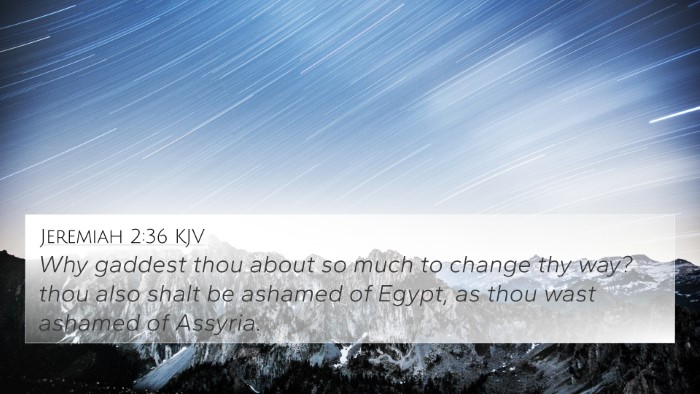Understanding Jeremiah 2:37
Jeremiah 2:37 states: "Yea, thou shalt go forth from him, and thine hands upon thine head: for the Lord hath rejected thy confidences, and thou shalt not prosper in them." This verse speaks to the consequences of Israel's turning away from God and placing their trust in false idols and alliances.
Context and Overview
The book of Jeremiah is a profound prophetic narrative delivering God's messages to Judah before the Babylonian exile.
- Historical Setting: The Israelites had consistently broken their covenant with God, leading to a dire warning from Jeremiah about impending judgment.
- Spiritual Implications: The call to repent and return to God is central to Jeremiah's message.
Key Insights from Public Domain Commentaries
Matthew Henry's Commentary
Matthew Henry emphasizes that the actions of the people reveal a misguided dependence on their own confidence and the alliances of sinful nations, which ultimately will not protect them. This verse highlights the futility of relying on human strength rather than on God.
Albert Barnes' Notes
Albert Barnes interprets Jeremiah's words as a strong rebuke of the people. He suggests that their reliance on their alliances will lead them to disappointment as God has displeased by their unfaithfulness. The reference to "hands upon thine head" signifies despair and the consequences of their misguided faith.
Adam Clarke's Commentary
Adam Clarke outlines that this verse serves as a warning to those who turn away from God. He points out that true beauty and strength come from reliance on God. The state of lamentation indicated by "hands upon thine head" reflects the heart's sorrow and acknowledgment of inferior trusts.
Thematic Connections
This verse opens discussions about the relationship between faith, trust, and human weaknesses. The themes present in Jeremiah 2:37 find resonance throughout Scripture:
- Faith in God vs. Trust in Human Alliances: The Israelites placed their confidence in worldly partners rather than in God’s promises.
- The Consequences of Rebellion: The narrative serves as a repeated message of the consequences faced by God’s people when they turn away from Him.
Cross-Referencing Biblical Texts
This verse strongly connects with several other passages that illustrate similar themes of trust, punishment, and the need for repentance.
- Proverbs 3:5-6: "Trust in the Lord with all your heart, and lean not on your own understanding." This emphasizes the importance of placing trust in God.
- Psalms 118:8: "It is better to trust in the Lord than to put confidence in man." This reinforces the central idea of Jeremiah 2:37.
- Isaiah 31:1: "Woe to those who go down to Egypt for help." This verse critiques those who seek help outside of God.
- Hosea 10:13: "You have plowed wickedness; you have reaped injustice." This relates to the fate awaiting the people due to their choices.
- Micah 7:3: "Their hands are on what is evil to do it diligently." This reflects the consequences of wrongful actions.
- Jeremiah 17:5: "Cursed is the man who trusts in man, and makes flesh his strength." This echoes the core message of reliance upon God.
- Romans 1:21: "Because that, when they knew God, they glorified him not as God." This illustrates the dread consequences of turning away from God.
Applications and Lessons
This scripture invites personal reflection on the areas of life where we may be placing our trust in the wrong sources:
- Evaluate Trust: Reflect on who or what you rely on in moments of struggle.
- Seek God’s Guidance: Make it a practice to seek God in prayer when making important decisions.
- Recognize Consequences: Be aware that placing faith in anything other than God can lead to disappointment.
Conclusion
Jeremiah 2:37 serves as a powerful reminder of the futility of misplaced trust and the importance of holding fast to God's promises. The verses that relate to it draw us back to the fundamental message of faithfulness in God and the dangers of rebellion.
As you study this passage, consider how it relates to other scriptures, and let it guide you in your journey of understanding and living out your faith.











